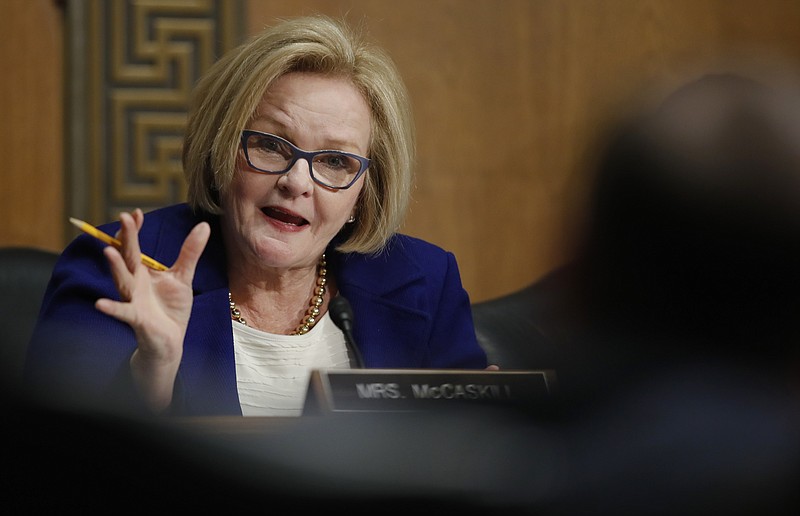America's taxpayers subsidize pharmaceutical companies' advertising by about $6 billion a year, U.S. Sen. Claire McCaskill said this week - and she's introduced a bill in Congress to end the subsidy.
Federal law allows companies that advertise to deduct some of those costs as an expense, reducing their tax liabilities.
That's where the subsidies occur, McCaskill said, telling reporters during a Thursday morning telephone conference call that her bill targets only the pharmaceutical industry - not every business that claims the deduction.
"Other than New Zealand, we are the only country that allows direct-to-consumer advertising of prescription drugs," she said. "We thought, rather than taking the step of outlawing prescription drug advertising, it would be better, at a minimum, just to take the step of not having taxpayers subsidize it."
Her bill is an outgrowth of ongoing studies she and other senators have been making of the pharmaceutical industry.
"One thing that has stuck out" in that research, McCaskill said, is "the world's 10 largest pharmaceutical firms - for the last year that we have complete data - were spending, in some instances, twice as much on sales and marketing as they were spending on research and development."
All but one of the top 10 companies "spent more on sales and marketing than they spent on research and development," she added, noting one company was about even, spending "$9 billion on sales and marketing, and $9.3 on R&D."
McCaskill said it's no secret to anyone watching commercial TV that "television advertising of prescription drugs has increased over the last decade - and particularly over the last two or three years."
She added: "I think the thing that's most insulting about this is, it would be one thing if they were driving demand so they could bring down costs, because the more people you have taking a drug, then the less you need to make on every unit of that drug in order to maintain - or even increase - profit."
As one example, she talked about the drug Humira, which she said was the number one-ranking drug for ad-spending in 2015. It is an immunosuppressive drug that is promoted to treat arthritis, plaque psoriasis, Crohn's disease and ulcerative colitis.
"They spent $273 million on advertising of that drug in 2014," McCaskill reported. "They spent $366 million on drug advertising in 2015 - a 34 percent increase in advertising.
"So, you would think if more people are asking for it, the price would stabilize.
"Oh, no - the price of Humira went up 22 percent from 2014 to 15. The average cost went from $2,642 to $3,223."
Only two of the top 10-advertised products - Latuda and Viagra - had a decrease in advertising in 2015 from 2014, according to a chart McCaskill provided, while nine of the 10 products had price increases.
Only Harvoni, which started advertising in 2015, didn't go up in price.
It stayed the same from 2014 to 2015 - at $31,500, she said.
She said the advertising is having an impact - more people are asking their doctors to prescribe a drug seen in an ad.
"I've talked to doctors (who) say now they spend a significant portion of their time talking patients out of drugs they have seen on TV - that they are not right for them," McCaskill said.
"Or in some instances, I've had doctors tell me they actually have talked (patients) out of conditions that patients are convinced they have, based on the television advertising."
She doesn't think her bill creates any First Amendment issues for the prescription drugs industry.
"We didn't allow prescription drug advertising in this country until relatively recently - maybe two or three decades ago," McCaskill explained. "Keep in mind, we're not saying they can't advertise.
"We're just saying taxpayers shouldn't fund it, that this shouldn't be under-written by taxpayer money."
Still, she predicted, the industry won't be happy with her bill.
"I know it will be a huge fight against pharma," McCaskill said. "But, it's the right thing to do."
The industry didn't respond to the proposal.
But the website FiercePharma noted in its story about the bill that other lawmakers have tried, and failed, to limit the drug companies' advertising subsidies.
And, the FiercePharma story reported, McCaskill's bill "is likely to face significant pushback from the advertising industry, which has argued in the past that barring one industry's ad deduction is discriminatory, and also the media industry, which gets significant revenue from prescription drug advertising."
The story said the pharma industry also "is likely to fight it, too, but perhaps in a quieter fashion."

